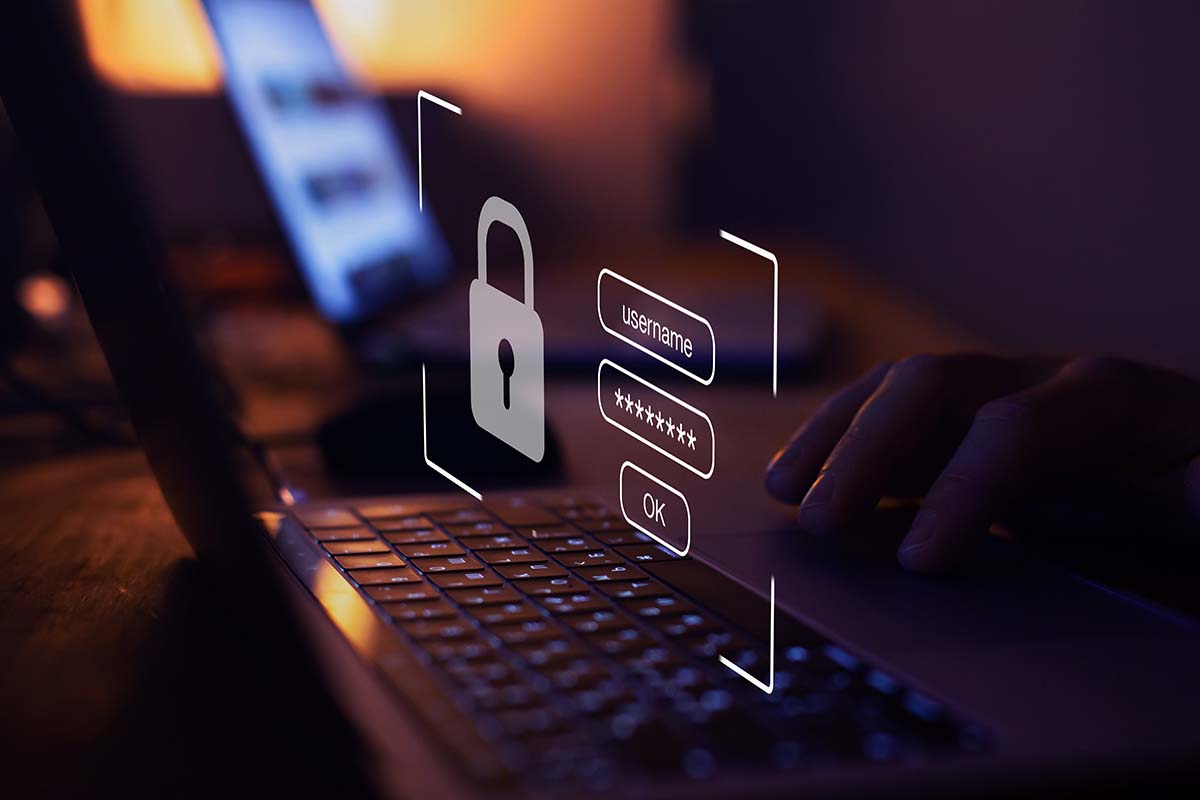What Are the Costs of Cyber Security? What You Need to Know
In today’s digital world, cyber security is a big worry for all kinds of businesses. As threats online keep changing, companies spend a lot to keep their stuff safe. But have you ever thought about how much cyber security really costs? This article looks into the different costs of having good cyber security, showing what companies really pay for.
Key Takeaways
- Cyber security has many costs, like buying software and hardware, paying for people, and following rules.
- When cyber attacks happen, like data breaches, companies can lose a lot of money.
- Following rules about data protection and legal fees is becoming more important.
- Services and insurance for cyber security can help cover some costs, but you need to think about them carefully.
- Good cyber security needs a plan that makes sense financially and helps reduce risks.
Understanding the Importance of Cyber Security
In today’s digital world, cybersecurity is key for all businesses. The threat landscape is always changing, bringing risks like data breaches and phishing scams. It’s vital to budget for online safety and manage digital risks well.
Read More: Why is Cyber Security Important?
The Evolving Threat Landscape
Cyber threats keep changing, so businesses must always be on guard. They need to protect their data and systems from hackers. The costs of recovering from cyber attacks have gone up a lot.
The Consequences of Cyber Attacks
A cyber attack can cause big problems, like financial losses and damage to a company’s reputation. A business needs to focus on cybersecurity to avoid high costs. These include recovering data, legal fees, and losing customer trust. It’s important to invest in good cybersecurity to protect digital assets and keep a business successful.
Read More: What is Cybersecurity? Types, Threats, and Cyber Safety Tips
Understanding cybersecurity and the changing threats helps businesses make smart choices. By investing in cybersecurity, companies can lower the costs of cyber attacks. This keeps their operations safe in the long term.

What are the costs of cyber security?
Keeping strong cyber security is key for all businesses and organizations. The costs of cyber security can be high and come from many areas. It’s important to know what these costs are for budgeting and planning.
The costs of cyber security fall into two main parts: direct costs and indirect costs. Direct costs are the money spent on keeping cyber security up and running. Indirect costs are the losses from cyber attacks or breaches.
Some main direct costs of cyber security include:
- Buying cyber security software and hardware, like firewalls and antivirus solutions.
- Pay for cyber security staff, including security analysts and incident response teams.
- Keeping cyber security systems and tools up to date.
- Legal fees for following data protection laws and industry rules.
The indirect costs of cyber security can be even bigger and harder to measure. These may include:
- Costs from data breaches, like fixing damaged data and systems and losing customer trust.
- Business disruptions and lost work from cyber attacks or downtime.
- Legal costs, fines, and lawsuits from cyber security issues.
Managing the costs of cyber security well means balancing risk, following rules, and keeping costs down. By understanding cyber security costs, organizations can make smart choices and use their resources wisely to fight cyber threats.
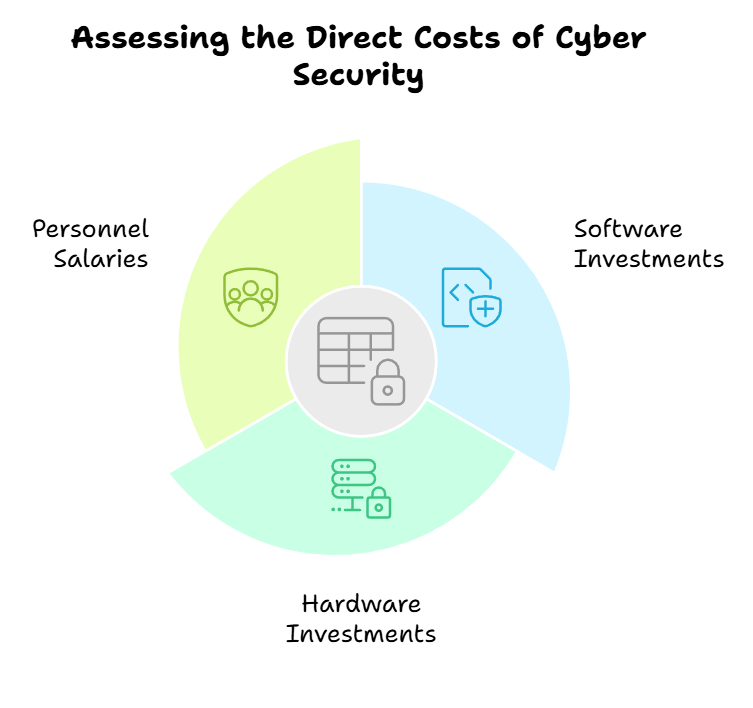
Assessing the Direct Costs of Cyber Security
Investing in cyber security can lead to significant costs. These include the initial expenses for software and hardware, as well as the ongoing salaries for cyber security staff. Organizations need to understand these costs to protect their digital assets.
Software and Hardware Investments
Strong cyber security needs investments in special software and hardware. This includes firewalls, antivirus programs, encryption tools, and secure networks. The costs vary based on the organization’s size and the level of protection needed.
Cyber Security Personnel Salaries
There’s a high demand for skilled cybersecurity experts, making their salaries a big part of the budget. Roles like security analysts and chief information security officers come with big fees. Having a skilled cybersecurity team is key to good cybersecurity and network security.
Knowing the direct costs of cyber security helps organizations plan and budget better. This knowledge aids in making smart decisions and using resources wisely to protect digital assets.
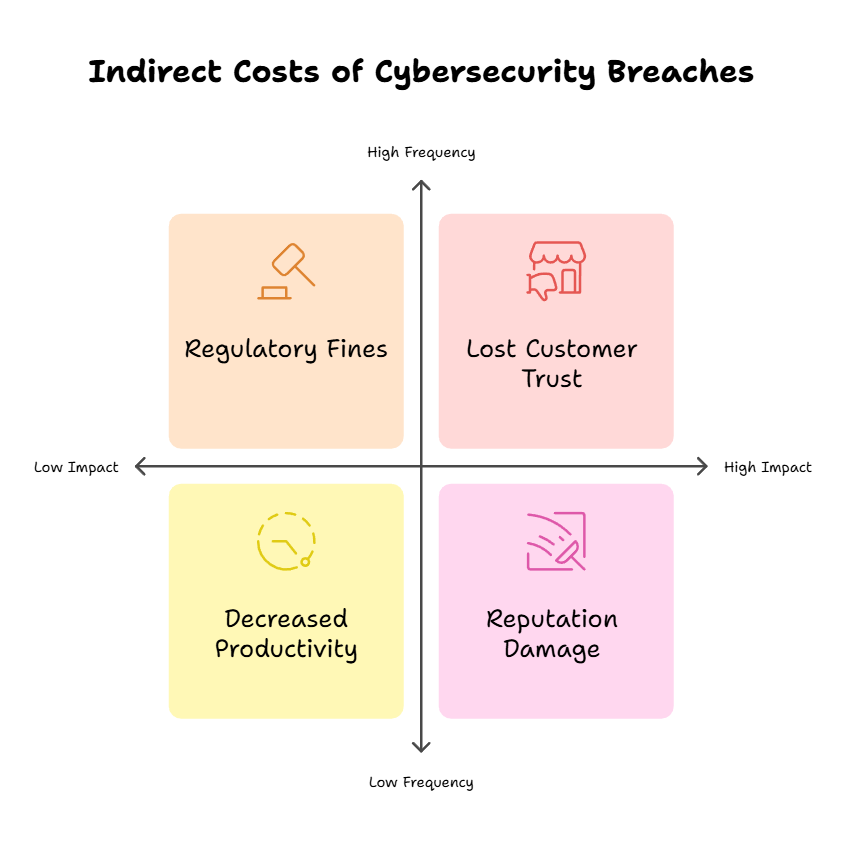
Indirect Costs of Cyber Security Breaches
The direct costs of fighting cyber threats are high, but the indirect costs can hurt a business more. These hidden costs from a data breach or cyber attack aren’t always in the price of security.
One big indirect cost is lost productivity. When a cyber issue hits, workers might stop their usual work to fix it. This means they need more time, and projects get delayed. This can make the whole company less efficient and less profitable.
Another indirect cost is losing customers. If customers don’t trust a company to keep their data safe, they might leave. This can lead to less money coming in and a smaller market share. The costs of preventing cyber-attacks and fixing data breaches can’t compare to losing customers over time.
After a cyber security breach, there might be legal and regulatory costs, too. Following data protection laws and industry rules can be expensive. Not following them can lead to big fines and legal trouble.
The indirect costs of cyber security breaches are hard to measure but can really affect a business’s profits. It’s important to plan for these costs when budgeting for security.
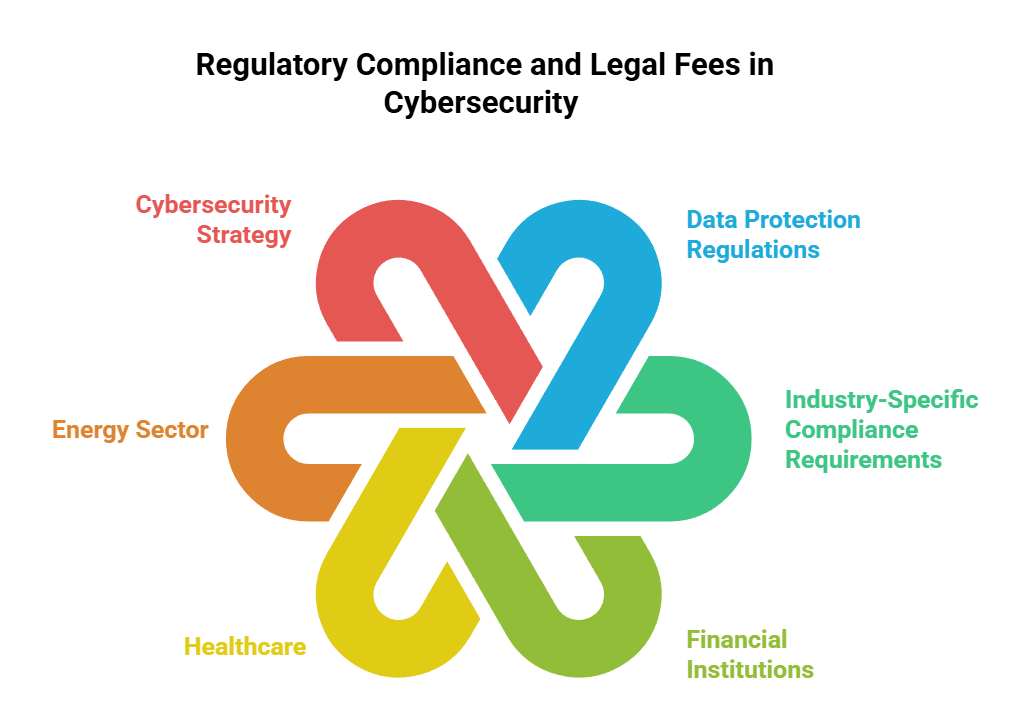
Regulatory Compliance and Legal Fees
Businesses face many challenges in the world of data protection and compliance. Costs for staying compliant can quickly grow. It’s important to think about network security, threat protection, digital risk management, and fighting cybercrime when planning security strategies.
Data Protection Regulations
Rules like the GDPR in Europe and the CCPA in the U.S. push companies to improve how they handle data and privacy. Follow these rules to avoid big fines and legal costs. So, it’s key for businesses to focus on managing digital risks and fighting cybercrime.
Industry-Specific Compliance Requirements
- Financial institutions must follow rules like the Sarbanes-Oxley Act and the PCI DSS. These rules affect their security spending and threat protection budgets.
- Healthcare companies need to meet HIPAA standards, which require strict data security and privacy.
- Energy, transportation, and critical infrastructure sectors have extra rules, like the NERC standards. This adds to their cybercrime defense costs.
Dealing with these rules and staying legal can be very costly for businesses. This shows why having a strong cyber security plan is crucial. It should cover both security investments and threat protection budgets.
The Cost of Cyber Security Training
In today’s world, keeping up with cyber security training is key. Your team is your first line of defense against cyber threats. They need the right knowledge and skills to handle different security risks.
Putting money into cyber security training is a smart move. It makes your company stronger against cyber attacks. Training helps your team stay alert and make smart choices to protect your data and assets.
The cost of cyber security training changes based on your company’s size, IT setup, and training needs. But, the benefits of a skilled and alert team are worth the cost.
- Training on phishing, password safety, and how to handle incidents can lower the chance of cyber attacks.
- Keeping up with training and awareness keeps your team up-to-date with new threats and best practices. This makes your security investments go further.
- Simulated cyber attacks and security checks can find and fix weak spots, making your security stronger.
Putting money into cyber security training builds a strong, informed team. This team is a strong defense against cyber threats. Investing in your team’s training is key to protecting your company’s data, reputation, and money.
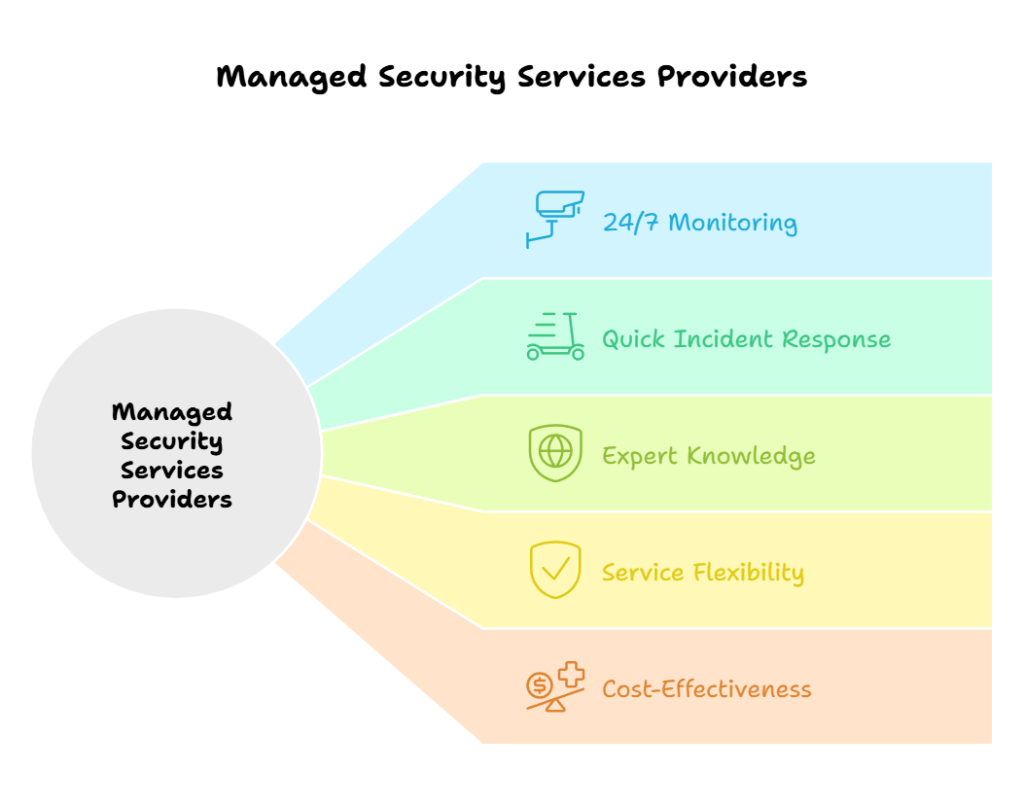
Managed Security Services Providers
As cyber threats grow, businesses of all sizes struggle to keep their digital assets safe. Building and keeping up a cyber security team is expensive. Many turn to managed security services providers (MSSPs) for a cheaper way to handle cyber threats and online security.
Outsourcing Cyber Security Functions
Using an MSSP for cyber security has many benefits. They offer 24/7 monitoring, quick response to incidents, and access to expert knowledge and tech. This way, companies can save money on their cyber security team.
MSSPs can also adjust their services as needed. This is great for small and medium businesses that can only afford a part security team. They can change their security plans without spending a lot.
Choosing to use an MSSP should be a thoughtful decision. Companies need to look at their needs, budget, and risk level. By comparing the benefits and costs, businesses can see if this is the best choice for their security needs.
Cyber Insurance: A Safety Net
The cyber threat landscape keeps changing, making businesses more at risk of data breaches and other cybercrimes. These risks can lead to huge costs, making cybersecurity expenses a big worry for companies. Cyber insurance acts as a safety net in such situations.
Cyber insurance policies aim to lessen the financial blow of cyber incidents. They cover things like data breach costs, legal fees, and costs from business interruptions. By sharing the cyber risk management costs with an insurance company, businesses can shield themselves from big losses.
But, cyber insurance is complex, with many options and exclusions. Before buying a policy, it’s key to look at the company’s specific cybercrime costs and risks. This ensures the coverage meets the business’s needs.
With the constant changes in the cyber threat landscape, cyber insurance is a vital safety net. It offers financial protection and peace of mind to businesses facing digital challenges.
Budgeting for Cyber Security
Protecting your business from cyber threats needs a smart budget plan. It’s important to look at the costs of managing cyber risks, securing networks, and dealing with data breaches and cybercrime. This helps you plan for the worst-case scenarios.
Risk Assessment and Prioritization
Start by doing a thorough risk assessment. This means figuring out what assets are most important, how likely cyber attacks are, and where to spend on security. It’s about making sure your budget matches your specific needs and weak spots.
After assessing risks, decide where to spend your security money. This could mean investing in training, new security tech, or hiring experts to handle security tasks. By focusing on the most critical areas, you can make the most of your cyber security budget.
Managing your cyber security budget is an ongoing task. Threats and vulnerabilities change all the time, so your budget should, too. By staying ahead and being strategic, you can keep your valuable assets safe from cyber threats.
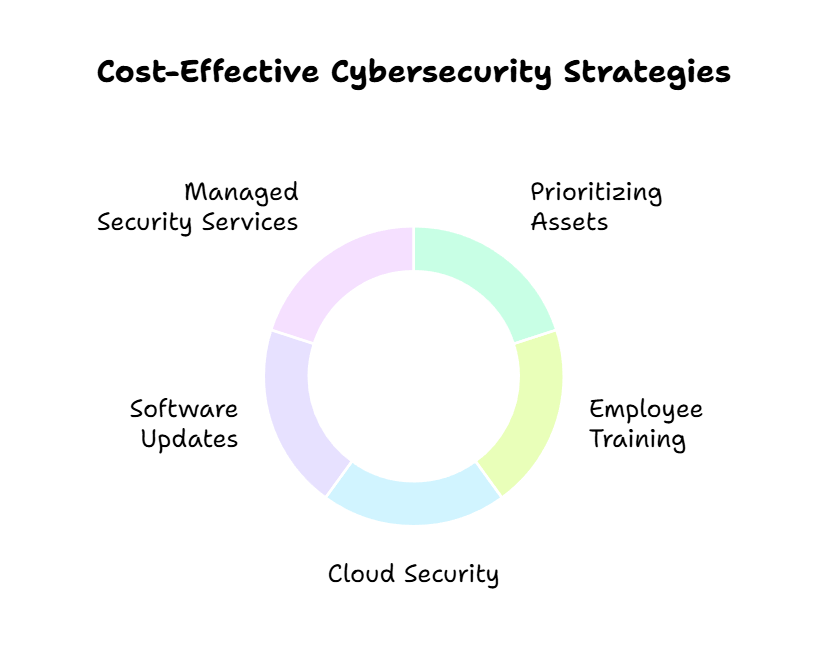
Strategies for Cost-Effective Cyber Security
In today’s digital world, cybersecurity costs are rising fast. Businesses need to find new ways to spend their security budget wisely. Using automation and making security processes more efficient is a key strategy.
Automation and Streamlining Processes
Automating security tasks can cut down on the work for your cybersecurity team. This lets them focus on important projects. It also makes your security setup more efficient and can lower costs.
Automated solutions for things like checking for vulnerabilities, updating software, and handling incidents can reduce cybercrime costs. This makes protecting your digital assets more affordable.
Streamlining security means making your current procedures better. It means getting rid of unnecessary steps and improving how teams talk and work together. This makes your security training and infrastructure more effective, saving money in the long run.
Using automation, optimizing processes, and focusing on cost can help your business stay safe and efficient. It’s a way to handle threats while keeping your digital world secure.
The Role of Ark Solvers in Cyber Security
In the complex world of cyber security, businesses face challenges in managing costs and making smart investments. Ark Solvers, a top cyber security firm, offers crucial advice and expertise. They help businesses handle cyber security risks and make the most of their resources.
Ark Solvers is an expert in assessing organizations’ cyber security risks. They create custom strategies and strong solutions. With their deep knowledge of cyber threats, they help businesses protect their data and networks.
Comprehensive Cyber Risk Management
Ark Solvers looks at cyber security from many angles, covering both technical and strategic sides. Their team of experts does detailed risk assessments. This helps clients focus their spending and use resources well.
Streamlining Cyber Security Processes
Ark Solvers also helps businesses save money on cyber security by making processes better. They automate tasks and make cyber security workflows smoother. This cuts down on costs, boosts efficiency, and frees up resources for important projects.
Leveraging Innovative Technologies
Ark Solvers is always ahead in using new cybersecurity technologies. They bring in the latest tools and methods to fight threats. This ensures businesses have the best ways to protect against cyber risks.
Working with Ark Solvers, businesses can handle cyber security costs with ease. They turn their cyber risk management into a strong point of advantage. This helps protect their digital assets from cybercrime.
Read More: What is the Main Role of Cyber Security?
Conclusion
With cyber threats always changing, knowing the costs of cyber security is key for all businesses. These costs include direct expenses like software, hardware, and people, as well as indirect costs like data breaches and following rules. It’s important to understand these financial aspects of cyber security.
Organizations can make better choices about where to spend on cyber security investments by looking at their risk management. Using managed security services and cyber insurance can lessen the financial hit while boosting network security and data protection.
The costs of cyber security must be balanced against the risks of cybercrime and data breaches. A thorough and cost-effective approach to cyber risk management helps protect assets, follow rules, and keep operations safe from new cyber threats.
FAQ
What are the typical costs associated with implementing and maintaining cyber security?
Cyber security costs include software, hardware, and people. They also cover indirect costs like data breaches and training. Businesses must think about the costs of cyber attacks like lost productivity and damage to their reputation.
How can businesses budget effectively for cyber security expenses?
To budget well for cyber security:
- Start with risk assessments.
- Focus on what your business needs most.
- Look for ways to save money, like automation and managed security services.
What is the role of cyber insurance in managing the costs of cyber security?
Cyber insurance helps protect businesses from the financial risks of cyber attacks. It’s important to consider the costs of getting and keeping this insurance when planning your cyber security budget.
How can Ark Solvers help businesses navigate the costs of cyber security?
Ark Solvers offers expert advice and solutions for better cyber security. They help businesses use their resources wisely to fight cyber threats effectively.
What are the indirect costs of cyber security breaches that businesses should consider?
Breaches can lead to lost productivity, losing customers, and damage to your reputation. They can also result in fines. These indirect costs are why investing in cyber security is so important.

